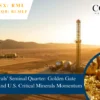Teva Pharmaceuticals and Amerisource Health Services initiated a voluntary recall of more than 580,000 bottles of prazosin hydrochloride capsules in October 2025. The chemical concern surrounds excessive levels of a substance known as Nitro Prazin impurity C, which belongs to the nitrosamine group of compounds. The U.S. Food and Drug Administration (FDA) classified the event as a Class II risk, which indicates a product may cause temporary or medically reversible adverse health effects.
Details of the Affected Product
Prazosin hydrochloride, prescribed primarily to manage high blood pressure, is available in 1 mg, 2 mg, and 5 mg capsule forms. Testing identified these capsules, distributed Australia-wide and globally, as containing nitrosamines above permitted safety thresholds. Nitrosamines can form during drug manufacturing or storage. Many people encounter these compounds in water and certain foods, but excessive intake over time can increase cancer risk.

580,000 bottles of prazosin hydrochloride capsules have been recalled
Scope of the Recall
The recall affects a large volume of medication:
- 181,659 bottles of 1 mg capsules
- 291,512 bottles of 2 mg capsules
- 107,673 bottles of 5 mg capsules.
Some bottles contain up to 1,000 capsules each. Pharmacies and health professionals received notices to immediately quarantine affected lots.
Health Risks and Official Guidance
Authorities say, “Nitrosamine impurities may raise the cancer risk if individuals are exposed to them in excessive amounts and for prolonged periods”. The FDA advises patients not to stop medication abruptly, and instead consult with healthcare providers as soon as possible.
The National Institutes of Health notes prazosin hydrochloride also serves patients with post-traumatic stress disorder (PTSD) symptoms, in addition to hypertension. The medication works by relaxing blood vessels, which increases blood flow. Health authorities have not received reports of injuries or cases directly linked to the recall as of the announcement date.
Background on Nitrosamine Contamination
Nitrosamines have triggered previous medicine recalls worldwide. These impurities can be introduced unintentionally during the pharmaceutical manufacturing process. Investigations into the origins of this contamination remain ongoing. Despite the recall, Teva Pharmaceuticals and Amerisource Health Services have not received any formal complaints attributable to affected medication batches.
Market Impact
Analysts predict this recall could affect thousands of patients using prazosin hydrochloride for blood pressure and related conditions. Pharmacies now face the task of identifying and removing affected lots from shelves, potentially disrupting daily medication routines for a segment of the population.
Also Read: ANZ’s $1.11 Billion Challenge: Inside the Bank’s Major Restructuring and Penalties
Actions for Consumers
Regulators urge those using prazosin hydrochloride capsules to immediately check medication labels and batch numbers against recall notices. Patients should not dispose of the medication until consulted by a pharmacist or doctor. “If you are currently using any of the recalled products, it is advisable to reach out to your pharmacist or healthcare professional to discuss your options and next steps,” the FDA emphasised.
Medical Community Response
Healthcare providers have increased outreach to at-risk patients. The Therapeutic Goods Administration and other health agencies in Australia continue to monitor international updates and will provide advice on alternative medications as needed.
Regulatory Follow-up
Authorities continue investigations into production and storage processes that led to nitrosamine contamination. Further regulatory action could follow, depending on the outcome of these inquiries and ongoing safety screenings of pharmaceutical products supplied both in Australia and globally.
Conclusion
The recall of prazosin hydrochloride marks another major action on medicine safety in Australia and globally. Regulators, health professionals, and pharmaceutical companies remain active in ensuring patients receive uncontaminated, effective medications. Patients are urged to remain informed, vigilant, and in regular communication with healthcare advisers as investigations proceed.












